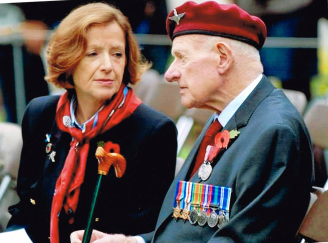
PC John Bosley's Reminiscences
War Veteran and Box's Village Policeman
June 2014
John tells the remarkable story of his time in Box in his own words.
His story is a unique insight into the tragedies and highlights
of our village 1955 to 1964. John now lives in Warminster.
Photos courtesy John and Tina Bosley
Left: At Arnhem with daughter Tina in 2013
War Veteran and Box's Village Policeman
June 2014
John tells the remarkable story of his time in Box in his own words.
His story is a unique insight into the tragedies and highlights
of our village 1955 to 1964. John now lives in Warminster.
Photos courtesy John and Tina Bosley
Left: At Arnhem with daughter Tina in 2013
Early Years
I was born in North Bradley and grew up in Salisbury after 1933, going to school there, until the outbreak of World War 2 when I volunteered for service. As a 19 year old I was parachuted into Arnhem with the 1st Airborne Division. It affected my view of the world because nothing afterwards was so terrible.
The Allies' target was to hold a huge bridge over the Rhine but things didn't go well and we faced massive German defences. My battalion got within a mile of the bridge but after fierce fighting we ran out of anti-tank defences. I was wounded by mortar shell and hospitalised. The Germans captured 300 of us and took us to Leipzig to work laying rail tracks to a coal face. Conditions were terrible: coffee made from acorns for meals and thin soup for supper.
I escaped by hiding down a coal shaft until the Americans rescued us. They gave us penicillin (the miracle cure). I was four years in the Paras and I finished my service in Palestine. I joined the Wiltshire Constabulary in 1947 and had eight years serving in Swindon, Salisbury and Corsham.
I was born in North Bradley and grew up in Salisbury after 1933, going to school there, until the outbreak of World War 2 when I volunteered for service. As a 19 year old I was parachuted into Arnhem with the 1st Airborne Division. It affected my view of the world because nothing afterwards was so terrible.
The Allies' target was to hold a huge bridge over the Rhine but things didn't go well and we faced massive German defences. My battalion got within a mile of the bridge but after fierce fighting we ran out of anti-tank defences. I was wounded by mortar shell and hospitalised. The Germans captured 300 of us and took us to Leipzig to work laying rail tracks to a coal face. Conditions were terrible: coffee made from acorns for meals and thin soup for supper.
I escaped by hiding down a coal shaft until the Americans rescued us. They gave us penicillin (the miracle cure). I was four years in the Paras and I finished my service in Palestine. I joined the Wiltshire Constabulary in 1947 and had eight years serving in Swindon, Salisbury and Corsham.
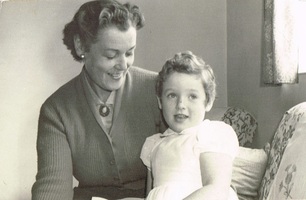 John's family, wife Hannah and daughter Tina in 1955
John's family, wife Hannah and daughter Tina in 1955
Welcome to Box
In August 1955, I moved to Box with my family to a police house on the London Road next to the Post Office, called Keep House (The Keep). It was a brand new property which we occupied rent free. After a few months they built a nice little office (Box Police Station) on the side of the house only about 8 foot by 8 foot, enough for a desk and a filing cabinet to file Police Gazettes and a telephone in there. It's still there but they have made it into a two-storey extension now.
In those days, Box was notorious because it was renowned for road traffic accidents (RTAs). The area had one or two RTAs every week. In fact, on the very day I moved in I met my neighbours when Richard Fudge from the Post Office got knocked off his bike and broke his arm. This was only a minor incident but there were more serious accidents.
In August 1955, I moved to Box with my family to a police house on the London Road next to the Post Office, called Keep House (The Keep). It was a brand new property which we occupied rent free. After a few months they built a nice little office (Box Police Station) on the side of the house only about 8 foot by 8 foot, enough for a desk and a filing cabinet to file Police Gazettes and a telephone in there. It's still there but they have made it into a two-storey extension now.
In those days, Box was notorious because it was renowned for road traffic accidents (RTAs). The area had one or two RTAs every week. In fact, on the very day I moved in I met my neighbours when Richard Fudge from the Post Office got knocked off his bike and broke his arm. This was only a minor incident but there were more serious accidents.
Life of a Village Policeman
Most of my duties were the ordinary things a village PC does, including dealing with hay rick fires and a fire at Box House owned by the Shaw-Mellors on Christmas Day one year. I also had to round up stray dogs and tie them to a tree to wait for the owners to collect them. I tried to deal with problems myself rather than to arrest people. Most of my arrests were drunks but usually I told them gently to go back home and sober up.
I remember the foot and mouth epidemics which occurred in 1953 and 1967 which caused scares throughout my time in Box. Mike Sloper at Wormwood Farm had a dead cow which had to be burnt in the middle of his field and buried. I spent the whole day doing this during which the night became really foggy and I couldn't find my way out of the field.
I spent most of my time sorting out applications for firearms, checking farmers' stock registers, keeping the youngsters in order and that sort of thing. I used to go out in the evenings and sort the pubs out. I was invited to have a drink in every pub; it's a good job I didn't visit every pub every day! The publicans were all very good and very friendly; most did as they were told and closed down at closing time or very near.
Most of my duties were the ordinary things a village PC does, including dealing with hay rick fires and a fire at Box House owned by the Shaw-Mellors on Christmas Day one year. I also had to round up stray dogs and tie them to a tree to wait for the owners to collect them. I tried to deal with problems myself rather than to arrest people. Most of my arrests were drunks but usually I told them gently to go back home and sober up.
I remember the foot and mouth epidemics which occurred in 1953 and 1967 which caused scares throughout my time in Box. Mike Sloper at Wormwood Farm had a dead cow which had to be burnt in the middle of his field and buried. I spent the whole day doing this during which the night became really foggy and I couldn't find my way out of the field.
I spent most of my time sorting out applications for firearms, checking farmers' stock registers, keeping the youngsters in order and that sort of thing. I used to go out in the evenings and sort the pubs out. I was invited to have a drink in every pub; it's a good job I didn't visit every pub every day! The publicans were all very good and very friendly; most did as they were told and closed down at closing time or very near.
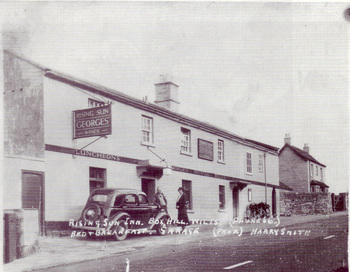 The Rising Sun before the tragedy
The Rising Sun before the tragedy
Rising Sun Explosion, 1957
That really does stick in my mind as one of the most severe problems we had to face. I had been in Box for about two and a half years dealing with the usual routine of police work. I think I can remember, possibly the night before the explosion, going there and asking the landlord, Mr Griffin, Everything all right? and it was.
I finished my shift on the actual night, the fourth of December 1957 and went home about midnight and went to bed. I was awoken about 4am by a massive explosion somewhere. I went to switch the light on, No Lights. I knew something very serious had happened here. I tried to dial up my headquarters in Corsham, No Telephone.
I tried Chippenham and Devizes Police HQ but I couldn't get through. By that time there was a knocking bang, bang, bang on the front door of the police station. I quickly got dressed and it was a gentleman with a car who said, Quick, the Rising Sun! There's a massive fire and explosion there.
I thought, Oh my goodness, what am I going to do? I picked up the phone again and tried Bath area. Luckily we could connect up with Bath City Police and I gave them the details. They responded well, sending fire engines, ambulances and got through to Police HQ Devizes. That's how we managed to get a bit of additional help in the village.
That really does stick in my mind as one of the most severe problems we had to face. I had been in Box for about two and a half years dealing with the usual routine of police work. I think I can remember, possibly the night before the explosion, going there and asking the landlord, Mr Griffin, Everything all right? and it was.
I finished my shift on the actual night, the fourth of December 1957 and went home about midnight and went to bed. I was awoken about 4am by a massive explosion somewhere. I went to switch the light on, No Lights. I knew something very serious had happened here. I tried to dial up my headquarters in Corsham, No Telephone.
I tried Chippenham and Devizes Police HQ but I couldn't get through. By that time there was a knocking bang, bang, bang on the front door of the police station. I quickly got dressed and it was a gentleman with a car who said, Quick, the Rising Sun! There's a massive fire and explosion there.
I thought, Oh my goodness, what am I going to do? I picked up the phone again and tried Bath area. Luckily we could connect up with Bath City Police and I gave them the details. They responded well, sending fire engines, ambulances and got through to Police HQ Devizes. That's how we managed to get a bit of additional help in the village.
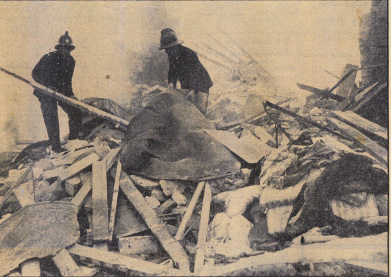 Photo courtesy Bath & Wilts Chronicle & Herald 4 December 1957
Photo courtesy Bath & Wilts Chronicle & Herald 4 December 1957
I went up to the Rising Sun and saw scenes I hadn't seen since the Second World War. Flames were emitting from the roadside, going as high as the telegraph poles. The Rising Sun was completely flattened and houses all round were damaged and there were people trying to find the occupants. By then help had arrived from Bath. We put a diversion on at Box to send all the traffic along the A365 up towards Melksham Road to take traffic to Chippenham.
We then searched in the debris and we found Mr Bill Griffin and his wife, Joyce, and their four year old son Andrew, who were all beyond help. I think there was also a little girl (Jane) who was still alive at that time and was taken immediately to hospital.
We then searched in the debris and we found Mr Bill Griffin and his wife, Joyce, and their four year old son Andrew, who were all beyond help. I think there was also a little girl (Jane) who was still alive at that time and was taken immediately to hospital.
The gas people were informed and they were in a bit of a fix because apparently there was a pipe running between Bath and Chippenham and if they turned the gas off completely it would have caused more explosions. So they had to gently turn it down slowly which meant the flames were still coming up very high all over the place, debris all over the road and the road completely blocked. Eventually we got more help from Wiltshire police: the inspector from Corsham arrived and the superintendent from Chippenham and we organised traffic control from the Corsham end. All day we were engaged up there and in that month alone I think I clocked up 285 hours of overtime. But in those days no policeman got overtime pay, all you got was time off in lieu if you were lucky. It was hopeless with that amount of overtime.
The gas board eventually controlled the gas coming through. The fire brigade managed to douse all the flames but it took all day to shift the debris from the road to get the ambulances and fire services in. There were two or three occupants of houses nearby; one was a chap called Charlie Woodgate who lived just below the pub and opposite the pub was a chap called Mr Dancey who was a special constable. They were there helping all day with the rescue work. We took statements from all the people who came to help and got information about what had happened. I got a Commendation from the Police Force for my work.(1)
The gas board eventually controlled the gas coming through. The fire brigade managed to douse all the flames but it took all day to shift the debris from the road to get the ambulances and fire services in. There were two or three occupants of houses nearby; one was a chap called Charlie Woodgate who lived just below the pub and opposite the pub was a chap called Mr Dancey who was a special constable. They were there helping all day with the rescue work. We took statements from all the people who came to help and got information about what had happened. I got a Commendation from the Police Force for my work.(1)
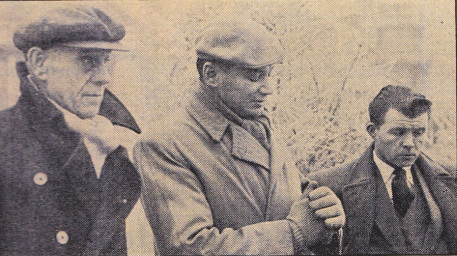 Left to Right: AT Dancey, Charlie Woodgate, Howard Steele (Bath & Wilts Chronicle & Herald)
Left to Right: AT Dancey, Charlie Woodgate, Howard Steele (Bath & Wilts Chronicle & Herald)
From then onwards it was a case of investigating the cause of the explosion. The Bath Gas Service came to the conclusion that there was a mains gas pipe running between Bath and Chippenham and the constant traffic on the A4 road had fractured the pipe letting gas seep into the cellar of the public house. It is surmised that the landlord must have switched the light on in the cellar smelling gas and off it went.
There was a lot of hard work afterwards because people kept visiting the pub to see what they could find in the debris. Eventually I attended the inquest in Bath. The little girl survived and in 1958 I understood the child was doing well.
There was a lot of hard work afterwards because people kept visiting the pub to see what they could find in the debris. Eventually I attended the inquest in Bath. The little girl survived and in 1958 I understood the child was doing well.
Manor Garage Fire, 1963
Another terrible tragedy happened in Box in January 1963 in the Manor House. I was on day off working in my garden, out of uniform. Someone rushed up to me and said, Quick, there's a fire on the High Street in the Garage and two children are trapped inside upstairs. I rushed up there and found people looking at the first floor. Smoke was pouring out of the door.
I rushed upstairs and was confronted by an absolute blanket of smoke. I got a handkerchief, put it round my mouth, got right down on the floor and went into the bedroom. I searched around about 6 inches away from the floor but I had to come out because I was beginning to suffocate. I was immediately joined by Mr Oswald Butt, who had been a police reserve, and he dived in and managed to find one child. We pulled her out and put her in the ambulance. By this time the fire brigade had arrived, put their masks on and managed to find the second child who unfortunately was very badly burnt. They took both children back to hospital where we learned that both had died.
Another terrible tragedy happened in Box in January 1963 in the Manor House. I was on day off working in my garden, out of uniform. Someone rushed up to me and said, Quick, there's a fire on the High Street in the Garage and two children are trapped inside upstairs. I rushed up there and found people looking at the first floor. Smoke was pouring out of the door.
I rushed upstairs and was confronted by an absolute blanket of smoke. I got a handkerchief, put it round my mouth, got right down on the floor and went into the bedroom. I searched around about 6 inches away from the floor but I had to come out because I was beginning to suffocate. I was immediately joined by Mr Oswald Butt, who had been a police reserve, and he dived in and managed to find one child. We pulled her out and put her in the ambulance. By this time the fire brigade had arrived, put their masks on and managed to find the second child who unfortunately was very badly burnt. They took both children back to hospital where we learned that both had died.
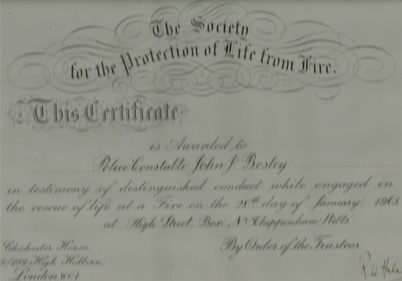 Certificate of Commendation awarded to John for his rescue work
Certificate of Commendation awarded to John for his rescue work
There was an enquiry as to what had happened. We found a paraffin oil heater had overturned in the bedroom, which really made a lot of black smoke. It was impossible to see your hand in front of your face in the room. We had to start taking statements but both children passed away, both of them. It was a real sad occasion, terrible.
To me it was a terrible tragedy but just another police job like the Rising Sun but a few months later I was called to attend a court in Corsham. Two awards were given: one to myself and another to a Box resident, Mr Oswald Butt. He thoroughly deserved it because he found the first child when it was almost impossible to find it and I was still groping around in the big room. We were both lucky to get out ourselves because we were coughing up for days after.
The ambulance wanted to take us both to hospital but I knew full well I still had a job to do. I got my uniform and started right away.
To me it was a terrible tragedy but just another police job like the Rising Sun but a few months later I was called to attend a court in Corsham. Two awards were given: one to myself and another to a Box resident, Mr Oswald Butt. He thoroughly deserved it because he found the first child when it was almost impossible to find it and I was still groping around in the big room. We were both lucky to get out ourselves because we were coughing up for days after.
The ambulance wanted to take us both to hospital but I knew full well I still had a job to do. I got my uniform and started right away.
Shockerwick Road Accident, 1960
Another incident sticks in my mind, a road traffic accident, down at Shockerwick, not on the main road but on the little road that runs parallel to the A4 and joins it just under the railway bridge. I think it must have been about 1960 but I am not sure.
I was on patrol one night at Box Fields and someone came up to me and said I think there's a road traffic accident down at Shockerwick. I can't see that there's anyone there. I thought I had better go down there. On the side road that leads to near the Northey Arms public house on the left hand side of the A4, under the railway bridge, I found a little A55 van and inside was four occupants.
The ambulance arrived and got them all out but none of them was alive. Apparently they had gone down the side road, the van had reared off the road and hit the buttress of the railway bridge down the chute, went up on its nose and hit the buttress head on. All the occupants went up, forward and cracked their skulls against the top of the van. No seat belts in those days.
Another incident sticks in my mind, a road traffic accident, down at Shockerwick, not on the main road but on the little road that runs parallel to the A4 and joins it just under the railway bridge. I think it must have been about 1960 but I am not sure.
I was on patrol one night at Box Fields and someone came up to me and said I think there's a road traffic accident down at Shockerwick. I can't see that there's anyone there. I thought I had better go down there. On the side road that leads to near the Northey Arms public house on the left hand side of the A4, under the railway bridge, I found a little A55 van and inside was four occupants.
The ambulance arrived and got them all out but none of them was alive. Apparently they had gone down the side road, the van had reared off the road and hit the buttress of the railway bridge down the chute, went up on its nose and hit the buttress head on. All the occupants went up, forward and cracked their skulls against the top of the van. No seat belts in those days.
We started making enquiries. They were four young lads from Bathford area, all 17 or 18 year olds, who had been to the pub drinking and they were all killed outright with no other vehicle involved. Later what struck me was that Princess Diana's accident was identical to the way these boys were killed.
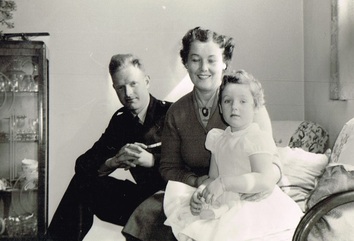 John, Hannah and Tina in 1957
John, Hannah and Tina in 1957
Happier Times
There was a lot of excitement in 1963 when the Beatles passed through the village on the 11 o'clock train to do a show in Bristol. The local children heard about the trip and when their teacher Mr Adams let them out for morning break they all lined up at Mill Lane station to see the band. I went along to keep order.
When I was on duty, I used to nip along to the Saturday night dance at the Bingham Hall. Then I would come home for tea and watch the Six-Five Special on the television and teach my daughter Tina how to rock-and-roll.
All my days were happy in Box; people were very good to me and looked after me and I tried to be good to them. We used to get a little bit of trouble from people from Bristol who had gone to Newbury Races. If they had a bad day at the races they used to stop in Box for a drink and cause a bit of a problem. I knew there was always a bit of help from the locals if there was trouble and they did; they always used to get behind me and help me.
There was a lot of excitement in 1963 when the Beatles passed through the village on the 11 o'clock train to do a show in Bristol. The local children heard about the trip and when their teacher Mr Adams let them out for morning break they all lined up at Mill Lane station to see the band. I went along to keep order.
When I was on duty, I used to nip along to the Saturday night dance at the Bingham Hall. Then I would come home for tea and watch the Six-Five Special on the television and teach my daughter Tina how to rock-and-roll.
All my days were happy in Box; people were very good to me and looked after me and I tried to be good to them. We used to get a little bit of trouble from people from Bristol who had gone to Newbury Races. If they had a bad day at the races they used to stop in Box for a drink and cause a bit of a problem. I knew there was always a bit of help from the locals if there was trouble and they did; they always used to get behind me and help me.
Kruger Barnett
I can remember one night the Bear pub rang me up because there had been an accident right outside about 1 or 2 am. An RAF officer drunk as a lord in his car had demolished the light standing there and his car as well. Unfortunately he had to go to Corsham Police Station. The thing I was most surprised about was when I got back to Box I went to get some red lights to put round the island there but it had already been done.
I can remember one night the Bear pub rang me up because there had been an accident right outside about 1 or 2 am. An RAF officer drunk as a lord in his car had demolished the light standing there and his car as well. Unfortunately he had to go to Corsham Police Station. The thing I was most surprised about was when I got back to Box I went to get some red lights to put round the island there but it had already been done.
|
We had an old roadman called Ern (Kruger) Barnett, wonderful old fellow, one eye and a cleft palate, who lived down Mill Lane. He had woken up in the middle of the night, saw there was no light at the junction and put two red lights up there. I thought what a wonderful citizen he was. He was single and every Saturday night he used to go out and get drunk and start singing. I used to encourage him to go to bed and one time he looked up and said Can 'e tell me the time wiv 'at moon up there?
|
Kruger asked, Can 'e tell Time by the Moon? |
I said come Ern, you're drunk; it's quarter to one!
Talking of Ern, he was about 64 or 65 when he eventually got married to an elderly lady. I saw him one night and asked him how he got on the first night. Cor! he said, Sweat, my shirt were wringing wet. I've never slept with a woman before. He was a remarkable old villager; he never stopped working, gritting the road, cutting the grass.
Youngsters
There were a lot of youngsters in the village, full of life, and they used to get round knocking on doors and fight between themselves, as youngsters do. I used to try to calm things down but one or two of the youngsters could get a bit rough and be a bit forceful. I reported very few of the locals; there was no need. I used to chase them but I can only remember one lad that I reported who was a Bathford lad.
Bonfire night was always a very tough night. The kids used to go round the village hurling fireworks at all and sundry, upsetting all the old folks. I had to be out there trying to calm things down, every firework night was the same. A lot of the kids came from Bathford, coming up to cause problems with our kids.
Talking of Ern, he was about 64 or 65 when he eventually got married to an elderly lady. I saw him one night and asked him how he got on the first night. Cor! he said, Sweat, my shirt were wringing wet. I've never slept with a woman before. He was a remarkable old villager; he never stopped working, gritting the road, cutting the grass.
Youngsters
There were a lot of youngsters in the village, full of life, and they used to get round knocking on doors and fight between themselves, as youngsters do. I used to try to calm things down but one or two of the youngsters could get a bit rough and be a bit forceful. I reported very few of the locals; there was no need. I used to chase them but I can only remember one lad that I reported who was a Bathford lad.
Bonfire night was always a very tough night. The kids used to go round the village hurling fireworks at all and sundry, upsetting all the old folks. I had to be out there trying to calm things down, every firework night was the same. A lot of the kids came from Bathford, coming up to cause problems with our kids.
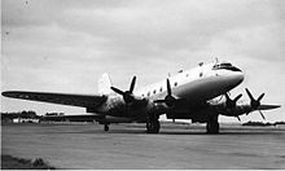 Hastings Bomber in 1953
Hastings Bomber in 1953
Colerne Airshow
I also remember on patrol one day watching the aircraft display at Colerne. I saw an aircraft appear from behind the hill and disappear behind another hill. This was followed by a lot of dirt being thrown up.
I thought that plane's crashed so I immediately went up towards Colerne on my moped. I found one of the Hastings transport aircraft had crashed in a field. We managed to get the crew out all safe and sound because this Hastings had overshot the runway.
I also remember on patrol one day watching the aircraft display at Colerne. I saw an aircraft appear from behind the hill and disappear behind another hill. This was followed by a lot of dirt being thrown up.
I thought that plane's crashed so I immediately went up towards Colerne on my moped. I found one of the Hastings transport aircraft had crashed in a field. We managed to get the crew out all safe and sound because this Hastings had overshot the runway.
Work with the Clergy
There was a Roman Catholic church at Pickwick and the padre was Father Supple who went around on a push-bike. He used to come round Box Fields regularly visiting his flock and collecting donations. One night we had a lot of break-ins up there in the pre-fabs. I was on observation about 4am and along came Father Supple. I asked him what he was doing so late and he said One of my parishioners needed some spiritual guidance. I didn't think any more about it and about a month later I saw a light on and asked who lived there. The answer came, That's Mrs Finnie; her husband's a docker in Liverpool.
We used to have a dance every Saturday night in the Community Centre at Box Fields. They were a cosmopolitan lot at Box Fields, every nationality under the sun, many Irish. There were numerous family squabbles and I used to have to push my bike up there to the old pre-fabs by the Tunnel Inn to try to keep the peace. One time quite a lot of clothing had vanished from the cloak room of the dance. Father Supple was there to keep an eye on things. I asked him for help and he found the culprits and the next day he got the clothing back but he wouldn't tell me who they were.
There was a Roman Catholic church at Pickwick and the padre was Father Supple who went around on a push-bike. He used to come round Box Fields regularly visiting his flock and collecting donations. One night we had a lot of break-ins up there in the pre-fabs. I was on observation about 4am and along came Father Supple. I asked him what he was doing so late and he said One of my parishioners needed some spiritual guidance. I didn't think any more about it and about a month later I saw a light on and asked who lived there. The answer came, That's Mrs Finnie; her husband's a docker in Liverpool.
We used to have a dance every Saturday night in the Community Centre at Box Fields. They were a cosmopolitan lot at Box Fields, every nationality under the sun, many Irish. There were numerous family squabbles and I used to have to push my bike up there to the old pre-fabs by the Tunnel Inn to try to keep the peace. One time quite a lot of clothing had vanished from the cloak room of the dance. Father Supple was there to keep an eye on things. I asked him for help and he found the culprits and the next day he got the clothing back but he wouldn't tell me who they were.
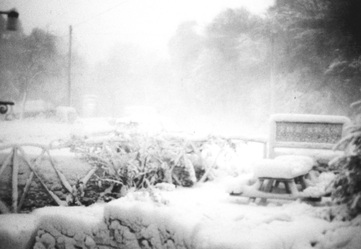 Kingsdown in 1962-3 (photo courtesy The Swan Inn)
Kingsdown in 1962-3 (photo courtesy The Swan Inn)
Winter 1962-63
I shall always remember the heavy snow fall we had in the winter 1962-63. In those days I used to help with the gritting and I can always remember going to the Post Office and collecting the pensions of the old age pensioners who couldn't get there. I thought that was how I could help. I couldn't do anything else because of all the snow.
That winter there was one tragedy. I remember that there was a very faithful old Box Hill person killed on the Devizes Road. He was driving between snow piled up on both sides of the road. A car was coming in the opposite direction.
Both cars were going terribly slow and they tried to stop and just gently slid into each other. That caused the steering wheel of the deceased to bang against his chest. It fractured his sternum and pierced his heart. I had to go with Vicar Tom Selwyn-Smith to tell his wife.
I shall always remember the heavy snow fall we had in the winter 1962-63. In those days I used to help with the gritting and I can always remember going to the Post Office and collecting the pensions of the old age pensioners who couldn't get there. I thought that was how I could help. I couldn't do anything else because of all the snow.
That winter there was one tragedy. I remember that there was a very faithful old Box Hill person killed on the Devizes Road. He was driving between snow piled up on both sides of the road. A car was coming in the opposite direction.
Both cars were going terribly slow and they tried to stop and just gently slid into each other. That caused the steering wheel of the deceased to bang against his chest. It fractured his sternum and pierced his heart. I had to go with Vicar Tom Selwyn-Smith to tell his wife.
Hungarians at Thorney Pitts
In 1956 there was a massive invasion of Hungary by the Russians and a lot of Hungarians came to the United Kingdom. Near the junction at Hawthorne there was a big hostel unused since the second world war called Thorney Pitts. So they opened it up and put 800 Hungarians there. In those days every alien had to be registered, photographed, finger printed and issued with an Alien's Registration Certificate.
It was the poor old police force's job to do that. After registering we had to check every two months to make sure they were still there and if they weren't we had to search for them. They couldn't speak any English at all.
They weren't all the nicest of people. I can remember there was a bit of a crime wave after they arrived. There was a little cottage further down the road from Thorney Pitts occupied by a game keeper called Mr Kempner. He was on the land of Shockerwick House. The cottage kept on being broken into. I arranged for Mr Kempner to put his key underneath the mat as he always did when he went out at 8 o'clock and I went upstairs to keep observation. I had only been there about ten minutes when I heard movement downstairs; the doors being opened; tramp, tramp, tramp coming up the stairs.
In 1956 there was a massive invasion of Hungary by the Russians and a lot of Hungarians came to the United Kingdom. Near the junction at Hawthorne there was a big hostel unused since the second world war called Thorney Pitts. So they opened it up and put 800 Hungarians there. In those days every alien had to be registered, photographed, finger printed and issued with an Alien's Registration Certificate.
It was the poor old police force's job to do that. After registering we had to check every two months to make sure they were still there and if they weren't we had to search for them. They couldn't speak any English at all.
They weren't all the nicest of people. I can remember there was a bit of a crime wave after they arrived. There was a little cottage further down the road from Thorney Pitts occupied by a game keeper called Mr Kempner. He was on the land of Shockerwick House. The cottage kept on being broken into. I arranged for Mr Kempner to put his key underneath the mat as he always did when he went out at 8 o'clock and I went upstairs to keep observation. I had only been there about ten minutes when I heard movement downstairs; the doors being opened; tramp, tramp, tramp coming up the stairs.
The Biggest Hungarian I have Ever Seen |
The door opened and there stood the biggest Hungarian I had ever seen. So I grabbed him and we tumbled down the stairs and there was a bit of a struggle. I had to pull my truncheon unfortunately, only the second time in forty years that I had to do that. I gave him a little tap on the nap and handcuffed him to the kitchen sink and he couldn't get away. I rushed for help on the telephone.
|
We took him to Chippenham Police Station and managed to find an interpreter. This chap's name was Joseph Haringozo. And about 12 months later I suddenly found myself dealing with about 18 burglaries in Leafy Lane, in the RAF married quarters and I couldn't find out anything: no fingerprints, nothing, even the CID were baffled. My unsolved crime rate went through the roof. There wasn't a lot of crime in Box, just minor break-ins, usually about one every week and I usually had about 50% rate.
About a year later my phone rang from Bristol CID asking, Did you have about 18 or 19 break-ins about 12 months ago? Well we have got the culprit called Joseph Haringozo. He has also admitted about 365 other crimes.
About a year later my phone rang from Bristol CID asking, Did you have about 18 or 19 break-ins about 12 months ago? Well we have got the culprit called Joseph Haringozo. He has also admitted about 365 other crimes.
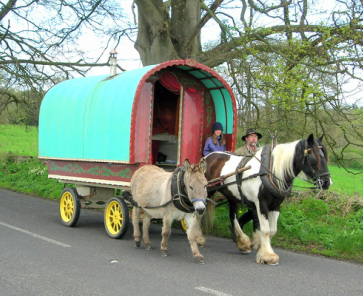 Travellers at Kingsdown (photo CMP)
Travellers at Kingsdown (photo CMP)
Travellers Arrive
Every year a load of gypsy travellers came parking on Wadswick Common and they always left a hell of a mess.[2] After a while I used to go and urge them to move on. We shall be going tomorrow, sir. They weren't gone tomorrow; they used to try to hold on with all the excuses: One of our members is ill, sir; one of our members can't travel, sir.
So what I used to do to get rid of them was to use a blue police form. Really these were for issuing to farmers for foot and mouth, or swine fever or whatever. You could sign these forms and the gypsies couldn't read the rest of the form and didn't know what they were. They soon shifted if they thought they had to go to court for parking on the common.
One time Farmer Pope from Kingsdown rang up asking me to investigate if a dog had killed his fowl. As I was reviewing lots of carcasses on the ground a gypsy came by and said, That be a fox that done it. I can smell him.
One time a gypsy boy died on Wadswick Common (or in Bath Hospital). His caravan was burned up there and they did his funeral procession from the common right down to Box Cemetery. I can remember the undertaker was a chap who lived in Wadswick. They used to have the best of everything for the funerals.
Another time a gypsy called Caroline Bowyers came to Box police station with a wound in her head caused after a fight on Wadswick Common. My wife who was a good theatre sister patched her up and off she went to avoid going to the hospital.
Every year a load of gypsy travellers came parking on Wadswick Common and they always left a hell of a mess.[2] After a while I used to go and urge them to move on. We shall be going tomorrow, sir. They weren't gone tomorrow; they used to try to hold on with all the excuses: One of our members is ill, sir; one of our members can't travel, sir.
So what I used to do to get rid of them was to use a blue police form. Really these were for issuing to farmers for foot and mouth, or swine fever or whatever. You could sign these forms and the gypsies couldn't read the rest of the form and didn't know what they were. They soon shifted if they thought they had to go to court for parking on the common.
One time Farmer Pope from Kingsdown rang up asking me to investigate if a dog had killed his fowl. As I was reviewing lots of carcasses on the ground a gypsy came by and said, That be a fox that done it. I can smell him.
One time a gypsy boy died on Wadswick Common (or in Bath Hospital). His caravan was burned up there and they did his funeral procession from the common right down to Box Cemetery. I can remember the undertaker was a chap who lived in Wadswick. They used to have the best of everything for the funerals.
Another time a gypsy called Caroline Bowyers came to Box police station with a wound in her head caused after a fight on Wadswick Common. My wife who was a good theatre sister patched her up and off she went to avoid going to the hospital.
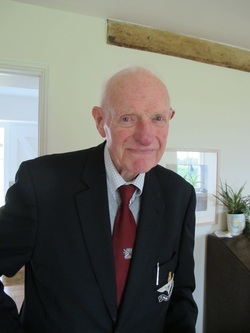
Departure 1964
Box was my happiest time in the police force and I was sorry when I was informed I was posted to West Lavington in 1964. I tried to stay in Box but I wasn't allowed.
Even the parish council wrote to the Chief Constable to ask to keep the village bobby as we like him. The leader of the council was Mr Chaffey. I used to ask the clerk if there was any trouble.
Not long after I left, they closed down the Box Police Station.
Left: John in June 2014 is in good health and his recollection of events in Box is remarkable.
Photo curtesy Carol Payne
Box was my happiest time in the police force and I was sorry when I was informed I was posted to West Lavington in 1964. I tried to stay in Box but I wasn't allowed.
Even the parish council wrote to the Chief Constable to ask to keep the village bobby as we like him. The leader of the council was Mr Chaffey. I used to ask the clerk if there was any trouble.
Not long after I left, they closed down the Box Police Station.
Left: John in June 2014 is in good health and his recollection of events in Box is remarkable.
Photo curtesy Carol Payne
References
[1] The full story of The Rising Sun tragedy was recorded by Mike Lyons and is available on-line at http://www.boxparish.org.uk
[2] Wadswick Common is sometimes called Hazelbury Common
[1] The full story of The Rising Sun tragedy was recorded by Mike Lyons and is available on-line at http://www.boxparish.org.uk
[2] Wadswick Common is sometimes called Hazelbury Common